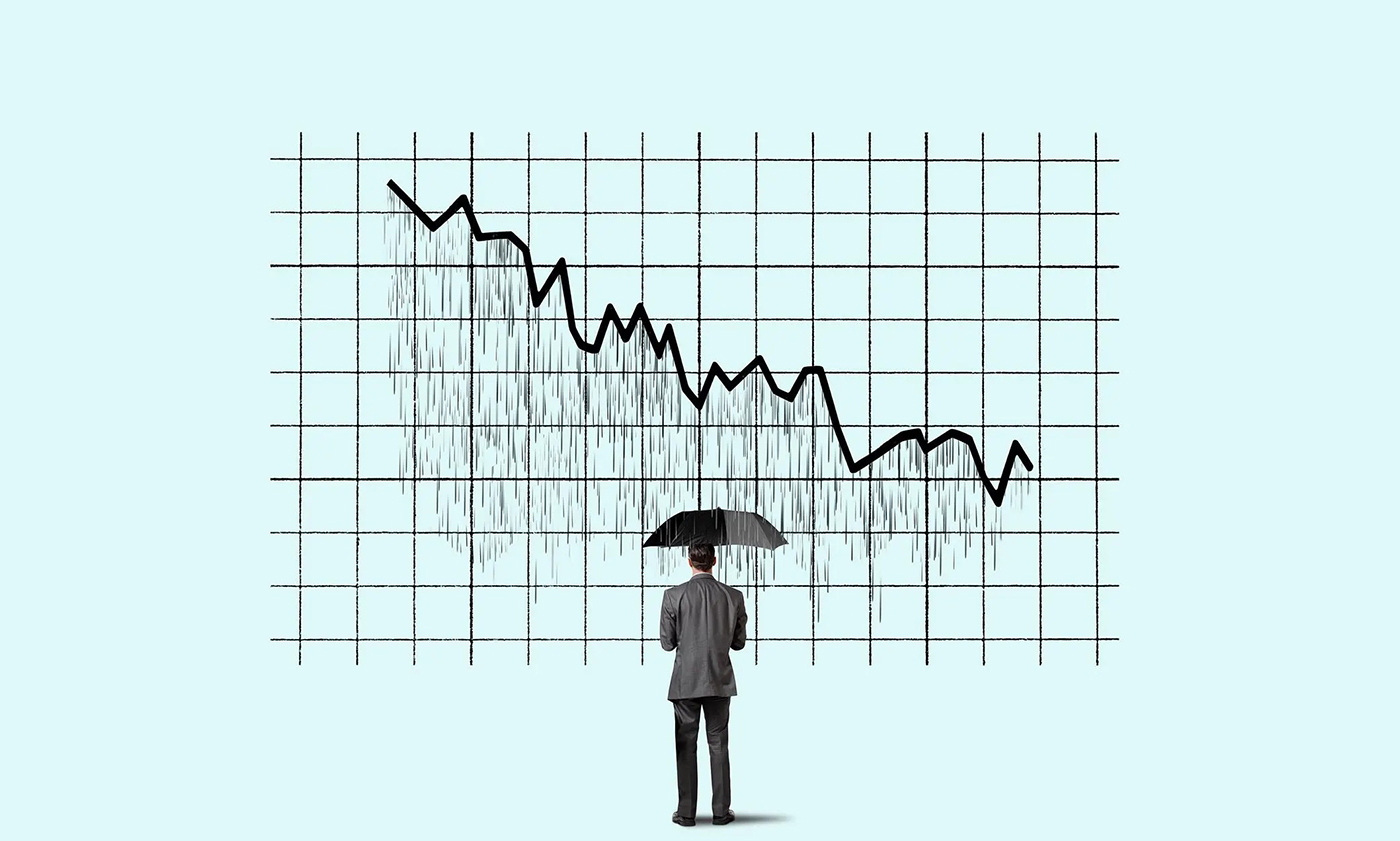
目前,華爾街對(duì)美國(guó)經(jīng)濟(jì)前景展開(kāi)了激烈辯論,。
有人認(rèn)為,,美聯(lián)儲(chǔ)(Federal Reserve)加息足以使通脹降溫,不會(huì)引發(fā)經(jīng)濟(jì)衰退,,即實(shí)現(xiàn)所謂的“軟著陸”,。
但也有人認(rèn)為,俄烏沖突,、中國(guó)因?yàn)樾鹿谝咔槎獬堑群暧^經(jīng)濟(jì)影響,,讓美聯(lián)儲(chǔ)在加息的同時(shí)維持經(jīng)濟(jì)增長(zhǎng),至少可以說(shuō)變成了一項(xiàng)艱難的任務(wù),。在這種情況下,,更有可能的結(jié)果是經(jīng)濟(jì)“硬著陸”,即在美聯(lián)儲(chǔ)控制通脹的同時(shí),,經(jīng)濟(jì)增速下滑,。
本周,有更多的支持者加入了“硬著陸”陣營(yíng),。
由喬納森·平格爾領(lǐng)導(dǎo)的瑞銀集團(tuán)(UBS)的經(jīng)濟(jì)學(xué)家在6月21日發(fā)表的一份報(bào)告中稱,隨著今年5月美國(guó)通脹刷新四十年最高紀(jì)錄,,“硬著陸風(fēng)險(xiǎn)大幅增加”,。
他們寫(xiě)道:“經(jīng)濟(jì)衰退風(fēng)險(xiǎn)增加,經(jīng)濟(jì)增長(zhǎng)大幅減速,,疫情政策支持被快速取消,,物價(jià)侵蝕實(shí)際收入。美國(guó)經(jīng)濟(jì)變得更加脆弱,,容易受到任何新出現(xiàn)的負(fù)面沖擊的影響,?!?/p>
瑞銀集團(tuán)依舊認(rèn)為美國(guó)經(jīng)濟(jì)最有可能出現(xiàn)的結(jié)果是“軟著陸”,但該投行的經(jīng)濟(jì)學(xué)家們認(rèn)為未來(lái)12個(gè)月發(fā)生全面衰退的幾率達(dá)到40%,,而在一個(gè)月前還只有2.5%,。
上周,美聯(lián)儲(chǔ)大幅加息75個(gè)基點(diǎn),,使經(jīng)濟(jì)學(xué)家們更加不看好美國(guó)的經(jīng)濟(jì)前景,。此次加息是數(shù)十年來(lái)最激進(jìn)的一次增加消費(fèi)者短期借款成本。
美聯(lián)儲(chǔ)的主席杰羅姆·鮑威爾表示,,他需要看到美聯(lián)儲(chǔ)決定加息之后“通脹下降的有說(shuō)服力的證據(jù)”,,因此瑞銀集團(tuán)現(xiàn)在假設(shè)今年美聯(lián)儲(chǔ)總計(jì)將加息175個(gè)基點(diǎn)。瑞銀集團(tuán)指出,,美聯(lián)儲(chǔ)加快加息,,增加了經(jīng)濟(jì)“硬著陸”的可能性,但這也有助于降低消費(fèi)物價(jià),。
事實(shí)上,,瑞銀集團(tuán)認(rèn)為,通脹率在今年5月刷新40年新高以后即將達(dá)到最高峰,。
然而,,瑞銀集團(tuán)的經(jīng)濟(jì)學(xué)家在6月21日對(duì)于他們的通脹高峰預(yù)測(cè)添加了一條“可能的”提醒說(shuō)明。因?yàn)樗麄冎霸?jīng)認(rèn)為通脹將在今年3月達(dá)峰,,卻沒(méi)有預(yù)料到能源成本持續(xù)高居不下,。
不止瑞銀集團(tuán)在本周發(fā)布了更悲觀的前景展望。
紐約聯(lián)邦儲(chǔ)備銀行(New York Federal Reserve)在6月21日發(fā)布的報(bào)告介紹了美聯(lián)儲(chǔ)的官員在預(yù)測(cè)過(guò)程中使用的一款經(jīng)濟(jì)模型,,在華爾街引起軒然大波,。
雖然該模型并非官方預(yù)測(cè),但它確實(shí)讓美國(guó)經(jīng)濟(jì)可能進(jìn)入困難時(shí)期這種說(shuō)法變得更有說(shuō)服力,。該模型顯示,,美國(guó)經(jīng)濟(jì)“硬著陸”的可能性約為80%,即國(guó)內(nèi)生產(chǎn)總值(GDP)增速為負(fù)但通脹持續(xù)上漲,。
另一方面,,未來(lái)10個(gè)季度GDP維持正增長(zhǎng)的“軟著陸”的概率只有10%。
紐約聯(lián)儲(chǔ)預(yù)測(cè),,2022年,,美國(guó)GDP增速將下降到負(fù)0.6%,2023年為負(fù)0.5%,。在通脹方面,,紐約聯(lián)儲(chǔ)認(rèn)為到2022年年底,消費(fèi)物價(jià)指數(shù)(CPI)將達(dá)到3.8%,,2023年為2.5%,。
紐約聯(lián)儲(chǔ)的前主席威廉·達(dá)德利在6月21日對(duì)《華爾街日?qǐng)?bào)》(Wall Street Journal)說(shuō):“我依舊認(rèn)為美國(guó)經(jīng)濟(jì)非常有可能硬著陸,,而且顯然通脹越持久,高通脹就會(huì)持續(xù)更長(zhǎng)時(shí)間,,這會(huì)增加硬著陸風(fēng)險(xiǎn),。”
當(dāng)然,,華爾街并非所有人都認(rèn)為經(jīng)濟(jì)前景一片黑暗,。研究機(jī)構(gòu)Independent Strategy的總裁、摩根士丹利(Morgan Stanley)的前全球策略師大衛(wèi)·羅奇于6月17日稱,,美聯(lián)儲(chǔ)依舊有機(jī)會(huì)避免經(jīng)濟(jì)衰退,。
羅奇表示,雖然華爾街對(duì)經(jīng)濟(jì)衰退的預(yù)測(cè)讓美國(guó)人感到憤怒,,但這只是表明銀行家們“在為了爭(zhēng)奪媒體的關(guān)注相互競(jìng)爭(zhēng),,于是會(huì)說(shuō)一些最可怕的話?!保ㄘ?cái)富中文網(wǎng))
譯者:劉進(jìn)龍
審校:汪皓
目前,,華爾街對(duì)美國(guó)經(jīng)濟(jì)前景展開(kāi)了激烈辯論。
有人認(rèn)為,,美聯(lián)儲(chǔ)(Federal Reserve)加息足以使通脹降溫,,不會(huì)引發(fā)經(jīng)濟(jì)衰退,即實(shí)現(xiàn)所謂的“軟著陸”,。
但也有人認(rèn)為,,俄烏沖突、中國(guó)因?yàn)樾鹿谝咔槎獬堑群暧^經(jīng)濟(jì)影響,,讓美聯(lián)儲(chǔ)在加息的同時(shí)維持經(jīng)濟(jì)增長(zhǎng),,至少可以說(shuō)變成了一項(xiàng)艱難的任務(wù)。在這種情況下,,更有可能的結(jié)果是經(jīng)濟(jì)“硬著陸”,,即在美聯(lián)儲(chǔ)控制通脹的同時(shí),經(jīng)濟(jì)增速下滑,。
本周,,有更多的支持者加入了“硬著陸”陣營(yíng)。
由喬納森·平格爾領(lǐng)導(dǎo)的瑞銀集團(tuán)(UBS)的經(jīng)濟(jì)學(xué)家在6月21日發(fā)表的一份報(bào)告中稱,,隨著今年5月美國(guó)通脹刷新四十年最高紀(jì)錄,,“硬著陸風(fēng)險(xiǎn)大幅增加”。
他們寫(xiě)道:“經(jīng)濟(jì)衰退風(fēng)險(xiǎn)增加,,經(jīng)濟(jì)增長(zhǎng)大幅減速,疫情政策支持被快速取消,,物價(jià)侵蝕實(shí)際收入,。美國(guó)經(jīng)濟(jì)變得更加脆弱,,容易受到任何新出現(xiàn)的負(fù)面沖擊的影響?!?/p>
瑞銀集團(tuán)依舊認(rèn)為美國(guó)經(jīng)濟(jì)最有可能出現(xiàn)的結(jié)果是“軟著陸”,,但該投行的經(jīng)濟(jì)學(xué)家們認(rèn)為未來(lái)12個(gè)月發(fā)生全面衰退的幾率達(dá)到40%,而在一個(gè)月前還只有2.5%,。
上周,,美聯(lián)儲(chǔ)大幅加息75個(gè)基點(diǎn),使經(jīng)濟(jì)學(xué)家們更加不看好美國(guó)的經(jīng)濟(jì)前景,。此次加息是數(shù)十年來(lái)最激進(jìn)的一次增加消費(fèi)者短期借款成本,。
美聯(lián)儲(chǔ)的主席杰羅姆·鮑威爾表示,他需要看到美聯(lián)儲(chǔ)決定加息之后“通脹下降的有說(shuō)服力的證據(jù)”,,因此瑞銀集團(tuán)現(xiàn)在假設(shè)今年美聯(lián)儲(chǔ)總計(jì)將加息175個(gè)基點(diǎn),。瑞銀集團(tuán)指出,美聯(lián)儲(chǔ)加快加息,,增加了經(jīng)濟(jì)“硬著陸”的可能性,,但這也有助于降低消費(fèi)物價(jià)。
事實(shí)上,,瑞銀集團(tuán)認(rèn)為,,通脹率在今年5月刷新40年新高以后即將達(dá)到最高峰。
然而,,瑞銀集團(tuán)的經(jīng)濟(jì)學(xué)家在6月21日對(duì)于他們的通脹高峰預(yù)測(cè)添加了一條“可能的”提醒說(shuō)明,。因?yàn)樗麄冎霸?jīng)認(rèn)為通脹將在今年3月達(dá)峰,卻沒(méi)有預(yù)料到能源成本持續(xù)高居不下,。
不止瑞銀集團(tuán)在本周發(fā)布了更悲觀的前景展望,。
紐約聯(lián)邦儲(chǔ)備銀行(New York Federal Reserve)在6月21日發(fā)布的報(bào)告介紹了美聯(lián)儲(chǔ)的官員在預(yù)測(cè)過(guò)程中使用的一款經(jīng)濟(jì)模型,在華爾街引起軒然大波,。
雖然該模型并非官方預(yù)測(cè),,但它確實(shí)讓美國(guó)經(jīng)濟(jì)可能進(jìn)入困難時(shí)期這種說(shuō)法變得更有說(shuō)服力。該模型顯示,,美國(guó)經(jīng)濟(jì)“硬著陸”的可能性約為80%,,即國(guó)內(nèi)生產(chǎn)總值(GDP)增速為負(fù)但通脹持續(xù)上漲。
另一方面,,未來(lái)10個(gè)季度GDP維持正增長(zhǎng)的“軟著陸”的概率只有10%,。
紐約聯(lián)儲(chǔ)預(yù)測(cè),2022年,,美國(guó)GDP增速將下降到負(fù)0.6%,,2023年為負(fù)0.5%。在通脹方面,紐約聯(lián)儲(chǔ)認(rèn)為到2022年年底,,消費(fèi)物價(jià)指數(shù)(CPI)將達(dá)到3.8%,,2023年為2.5%。
紐約聯(lián)儲(chǔ)的前主席威廉·達(dá)德利在6月21日對(duì)《華爾街日?qǐng)?bào)》(Wall Street Journal)說(shuō):“我依舊認(rèn)為美國(guó)經(jīng)濟(jì)非常有可能硬著陸,,而且顯然通脹越持久,,高通脹就會(huì)持續(xù)更長(zhǎng)時(shí)間,這會(huì)增加硬著陸風(fēng)險(xiǎn),?!?/p>
當(dāng)然,華爾街并非所有人都認(rèn)為經(jīng)濟(jì)前景一片黑暗,。研究機(jī)構(gòu)Independent Strategy的總裁,、摩根士丹利(Morgan Stanley)的前全球策略師大衛(wèi)·羅奇于6月17日稱,美聯(lián)儲(chǔ)依舊有機(jī)會(huì)避免經(jīng)濟(jì)衰退,。
羅奇表示,,雖然華爾街對(duì)經(jīng)濟(jì)衰退的預(yù)測(cè)讓美國(guó)人感到憤怒,但這只是表明銀行家們“在為了爭(zhēng)奪媒體的關(guān)注相互競(jìng)爭(zhēng),,于是會(huì)說(shuō)一些最可怕的話,。”(財(cái)富中文網(wǎng))
譯者:劉進(jìn)龍
審校:汪皓
There’s fierce debate on Wall Street about what lies ahead for the U.S. economy.
Some argue that the Federal Reserve can raise interest rates enough to cool inflation without sparking a recession, ensuring a so-called soft landing.
But others claim macroeconomic woes like the war in Ukraine and COVID-19 lockdowns in China have made maintaining economic growth as the Fed raises interest rates a difficult task, to say the least. That makes a “hard landing,” where economic growth declines as the Fed combats inflation, the more likely outcome.
And this week, the “hard landing” camp got a few more supporters.
UBS economists, led by Jonathan Pingle, said in a June 21 note that “the risk of a hard landing is rising” after inflation hit a fresh four-decade high in May.
“Recession risks are rising. Growth is slowing sharply. Pandemic policy support is being removed rapidly. Prices are eroding real income. The economy looks increasingly vulnerable to any new negative shock,” they wrote.
UBS still believes a “soft landing” is the most likely outcome for the U.S. economy, but the investment bank’s economists now see a 40% chance of an outright recession over the next 12 months, up from just 2.5% a month ago.
The more bearish outlook comes after the Federal Reserve hiked interest rates by 75 basis points last week, marking the most aggressive increase in short-term borrowing costs for consumers in decades.
With Fed Chair Jerome Powell saying that he needs to see “compelling evidence inflation is coming down” after the Fed’s decision, UBS is now factoring in a total of 175 basis points in rate increases this year. The increased pace of interest rate hikes raises the odds of a “hard landing” for the economy, but it should also help bring down consumer prices, UBS says.
In fact, the investment bank is calling the peak in inflation after May’s four-decade high.
However, its economists added a “probably” caveat to their peak inflation prediction on June 21, as they previously argued inflation would peak in March, only to be surprised by the persistence of high energy costs.
UBS isn’t alone in pushing a more pessimistic outlook this week either.
The New York Federal Reserve released a report on June 21 that includes an economic model used by Fed officials in their forecasting process—and it’s making waves on Wall Street.
While the model isn’t an official forecast itself, it does lend weight to the argument that the U.S. economy could be headed for tough times, revealing that the chances of a “hard landing,” where gross domestic product turns negative but inflation remains elevated, are about 80%.
On the other hand, the probability of a “soft landing,” in which GDP remains positive over the next 10 quarters, is just 10%.
The New York Fed sees U.S. GDP falling to negative 0.6% in 2022, and negative 0.5% in 2023. And when it comes to inflation, it argues the consumer price index (CPI) will hit 3.8% by the end of 2022, and 2.5% in 2023.
“I do continue to think that a hard landing is very likely, and obviously the more persistent the inflation is, the higher inflation is for longer, and that makes the hard landing risk go up,” former New York Fed president William Dudley told the Wall Street Journal on June 21.
Of course, not everyone on Wall Street is predicting economic doom and gloom. David Roche, president of the institutional research firm Independent Strategy and former global strategist at Morgan Stanley, said on June 17 that there’s still a chance the Fed can avoid a recession.
While recession predictions from Wall Street have Americans riled up, it’s largely an example of bankers “rivaling each other to get the headlines and say the most awful things about the world,” Roche said.






